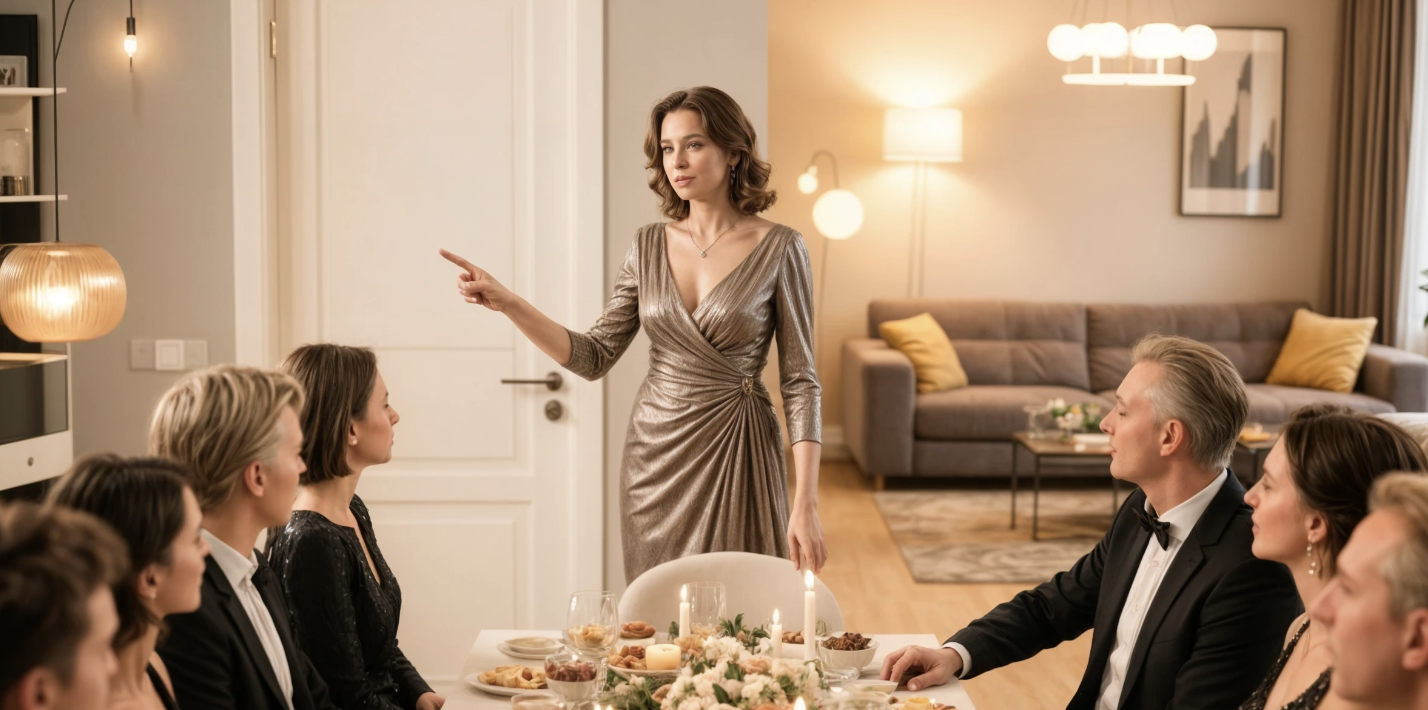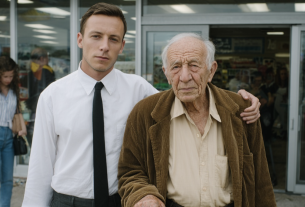Anna Vladimirovna sat at the kitchen table, scrolling through photos on her phone. Forty years old — a milestone birthday. She wanted to throw a real celebration, invite friends, colleagues, maybe even order a cake from a bakery. For the first time in a long while, she felt the desire to mark her birthday with a splash.
“Anya, have you completely lost your mind?” Valentina Petrovna’s voice cut through the silence of the apartment like a knife. Her mother-in-law appeared in the kitchen doorway, holding her usual bouquet from her own garden.
“Good afternoon, Valentina Petrovna,” Anna didn’t look up from her phone. “Come in, the tea is on the stove.”
“What tea! Tell me, what nonsense did you tell Seryozha about the birthday? Forty years is a bad omen to celebrate!”
Anna slowly put down her phone and looked at her mother-in-law. Valentina Petrovna stood in her usual gray cardigan she’d been wearing for about ten years, looking at her daughter-in-law as if she had just suggested dancing naked in Red Square.
“It’s my birthday, and I have the right to decide how to celebrate it,” Anna said calmly.
“You have the right!” Valentina Petrovna threw her hands up. “Forty years — that’s not celebrated! Everyone knows it’s a bad omen. My grandmother used to say: if you celebrate forty, your life will go downhill.”
Anna smirked:
“Your grandmother probably said a lot of things. Times have changed.”
“Times, times…” Valentina Petrovna went to the stove, poured herself tea into her favorite mug — the very one Anna hated because her mother-in-law brought it from her own home and put it in their kitchen cabinet without asking. “And do you know that the neighbor Zina celebrated her fortieth birthday last year? She lost her husband a month later.”
“Valentina Petrovna,” Anna stood and walked to the window, “Zina lost her husband because he’d been drinking like a fish for twenty years. Not because she celebrated her birthday.”
“You’re always trying to be clever! Always!” her mother-in-law’s voice rose. “I didn’t raise my son for him to end up with a… with a modern woman like you.”
Valentina Petrovna pronounced the word “modern” as if it were a curse.
Anna turned to her:
“And what exactly is so bad about me being modern? I work, I earn, I run the household…”
“Run the household!” her mother-in-law snorted. “Yesterday I came over — you have dust on the shelves, Seryozha’s shirt is hanging un-ironed, and you’re sitting at the computer typing something.”
“I was working. Remotely. It’s called a career.”
“Career…” Valentina Petrovna sipped her tea. “And family? And home? Where are the grandchildren?”
That question about grandchildren came up every time her mother-in-law visited. And she visited often — almost every day. She had her own key to their apartment, which Sergey gave her “just in case” during the first year of their marriage. Apparently, that “just in case” had become permanent.
“Valentina Petrovna, Seryozha and I are trying,” Anna sat back down at the table. “But for now, we’re fine as is.”
“Fine! At your age, it’s time to think about these things. Forty’s around the corner, and you’re still partying.”
“That’s exactly why I want to celebrate this birthday. Nicely, with friends, a good table.”
Valentina Petrovna slammed her mug on the table so hard tea splashed onto the oilcloth:
“No! I won’t allow it! I will talk to Seryozha. He has to stop you.”
“Seryozha supports me,” Anna lied, since her husband didn’t yet know the full scale of her plans.
“We’ll see,” her mother-in-law threatened and headed for the door. “We’ll see what he says.”
Left alone, Anna leaned on the table and closed her eyes. Eight years. Eight years she had endured these daily visits, lectures, advice, both warranted and not. How to cook the first course (“You salt it wrong, Seryozha doesn’t like oversalted food”), how to iron shirts (“Start the collar with the corners”), how to greet her husband after work (“A man should see that he’s awaited at home”).
At first, Anna tried to object gently, then more firmly, then simply went silent. But lately, silence had become harder. Especially when Valentina Petrovna started rearranging things in their apartment, moving dishes around, or, as last month, throwing away flowers she considered “already wilted” (though they were in full bloom).
That evening, when Sergey came home from work, Anna already knew the conversation would be difficult. Her husband was tired, irritated, and the first thing he said after taking off his jacket was:
“Mom called. Says you came up with some nonsense about the birthday.”
“What nonsense?” Anna stood by the stove, stirring dinner.
“Well, this… the fortieth celebration. Mom says it’s a bad omen.”
“Seryozha,” Anna turned to him, “do you really believe in these superstitions?”
Sergey shrugged:
“I don’t know. But mom doesn’t say it for no reason. She’s seen a lot in her life.”
“Seen a lot,” Anna repeated. “And what about me? I’m almost forty, and I want to celebrate this milestone beautifully. Invite friends, colleagues, set a proper table. What’s wrong with that?”
“Nothing wrong,” Sergey sat at the table, “but why upset mom? You could celebrate quietly, as a family.”
“We celebrate quietly and as a family every year. But this year I want it differently.”
“Anya,” Sergey’s voice became coaxing, “why do you need this headache? Guests, fuss, cooking…”
“I’ll take care of the cooking. And the fuss, too.”
“And mom?”
“What about mom?”
“She’ll be upset if we don’t listen to her advice.”
Anna put the frying pan on the table a little more sharply than she intended:
“Seryozha, it’s my birthday. MINE. Not your mother’s. And I’ll decide how to celebrate it.”
Her husband looked at her surprised, as if seeing her for the first time:
“Are you mad at mom?”
“I’m not mad. I’m tired.”
“Tired of what?”
“Tired that in my own home I can’t make a single independent decision. That your mother acts like she owns our apartment. That every step I take is discussed and criticized.”
Sergey was silent, poking at his potatoes with a fork.
“Seryozh,” Anna sat opposite him, “I’m not asking you to choose between me and mom. I’m asking you to support me when it comes to my birthday. Is that so hard?”
“All right,” he finally said. “Do as you wish. But if anything — I warned you.”
The next two weeks were a real trial. Valentina Petrovna appeared every day, each time with new arguments against the celebration. She brought newspaper clippings about the importance of respecting folk traditions or told scary stories about people who celebrated their fortieth and then misfortunes befell them.
“Anyochka,” she said while pouring herself tea from their teapot and finishing off their cookies, “listen to me, as a mother. I wish you well. Cancel this party. Better go to church and light a candle.”
“Valentina Petrovna, I don’t believe,” Anna replied patiently.
“See! And then you wonder where the misfortune comes from! You’re godless, and you want to throw parties.”
Anna continued preparing. She ordered a cake, planned the menu, sent invitations. Thirty people confirmed they would come. Colleagues from work, old friends, neighbors they were close with. Even her sister was supposed to come from another city.
Three days before the party, Valentina Petrovna made her last attempt:
“Seryozha,” she told her son when he stopped by on his way from work, “you must forbid your wife this nonsense. Are you a man or not?”
“Mom, she’s an adult,” Sergey replied wearily.
“Adult! Forty years old and no sense! Look at what she’s doing. Spending money on nonsense, inviting guests… And who will clean? Who will cook? She’s at work all day, doesn’t take care of the home.”
“Mom, stop.”
“I won’t! It’s my duty to warn my son. Your wife is wrong, Seryozha. I said it from the start. She’s not one of us.”
“Mom!”
“What mom? I’m telling the truth. A proper woman runs the home, bears children, obeys her husband. And this one… a career woman.”
“Mom, not about the children… we’re trying, it’s hard for us.”
The woman fell silent.
On the birthday morning, Anna woke early. The apartment smelled of fresh baking — she had been cooking all night. On the table was the ordered cake, salads, snacks, drinks were waiting in the fridge. Everything was ready.
Sergey left for work in the morning — he took the evening off. Anna stayed home alone and finally felt the anticipation of the celebration. She put on a new dress, did her hair, put on makeup. In the mirror, a beautiful forty-year-old woman looked back — one who had the right to be happy.
The first guests began arriving at five. Lena from work brought a bouquet of roses, Igor and Sveta brought a good bottle of wine and a glossy art album Anna had long wanted to buy. Gradually the apartment filled with people, laughter, and conversations.
Anna fluttered among the guests, accepting congratulations, watching the table. She hadn’t felt so light and joyful in a long time. It was her party, her day, her decision.
At half past six, when everyone was gathered and Sergey was giving the first toast, the door opened. Valentina Petrovna appeared in her festive outfit — the same blue dress she wore to all family celebrations for the past ten years.
Conversations stopped. Everyone turned to the door.
“Valentina Petrovna!” Sergey lowered his glass. “Mom, you said you wouldn’t come…”
“I changed my mind,” the mother-in-law answered dryly, scanning the crowd. “I decided to come after all. To congratulate my daughter-in-law.”
Anna stood by the table, feeling tension spread through the room. The guests exchanged looks, unsure of what was happening.
“Come in,” Anna finally said. “Though you weren’t invited.”
“Not invited…” repeated Valentina Petrovna. “And I didn’t come for an invitation. I came to make a toast.”
She walked to the table, took a glass of water, and raised it:
“Dear guests! Let’s congratulate our birthday girl on her fortieth. Although she celebrates it against all omens and common sense. But what can you do — youth doesn’t listen to elders. So let’s drink to our Anyochka growing wiser at least by forty and learning to heed the advice of experienced people!”
Guests stood with raised glasses, unsure how to react to such a toast. Silence settled.
Anna looked at her mother-in-law, then at her husband who glanced confusedly from his mother to his wife, then at the guests who clearly felt uncomfortable.
“Valentina Petrovna,” she said calmly, “you are not welcome at this celebration.”
“What?!” the mother-in-law slammed her glass on the table so hard water spilled.
“You heard me. You’re not welcome here. This is my birthday, my home, and I decide who is a welcome guest and who is not.”
“How dare you?!” Valentina Petrovna’s voice went up. “This is my son’s home!”
“Our family home. And today is a celebration in our family. You’re ruining this celebration. So please leave.”
Anna went to the door and opened it.
“Seryozha!” Valentina Petrovna called to her son. “Do you hear what your wife is saying?!”
Sergey stood pale, clutching his glass. He looked at his mother, then at his wife.
“Mom,” he said quietly, “maybe it’s better… some other time?”
“Impossible!” exclaimed the mother-in-law. “They’re kicking me out of my own son’s house!”
“No one is kicking you out,” Anna said evenly. “You can come tomorrow. Or the day after. Whenever you want. But not today. Today is my birthday, and I have the right to celebrate it the way I want.”
Valentina Petrovna walked to the door, stopped next to her daughter-in-law:
“You’ll regret this day,” she hissed. “Celebrate your fortieth — expect trouble.”
“Goodbye, Valentina Petrovna,” Anna said and closed the door behind her.
For a while, the apartment was silent. Then Lena raised her glass:
“To the birthday girl! To her always standing up for herself!”
“To Anna!” the others echoed.
The party continued. Gradually the awkwardness faded, the guests relaxed and talked louder. Anna received congratulations, laughed, danced to the music a friend had put on.
Only Sergey remained somewhat distant, often checking his phone — apparently his mother was texting him.
The guests left after midnight. Anna cleared the table, washed dishes, Sergey silently helped.
“It was a good party,” she said, wiping the last plate.
“Uh-huh,” her husband grunted.
“Were you upset about mom?”
“What do you think?” he turned to her. “She’s an elderly woman, Anya. You could have spared her the embarrassment in front of everyone.”
“I didn’t embarrass her. I defended my celebration.”
“From your own mother-in-law?”
“From someone who came uninvited and gave an insulting toast.”
Sergey shook his head:
“You’ve gotten kind of tough, Anya. It wasn’t like this before.”
“I never had a reason to be tough before.”
“Mom cares about us. In her own way, but she cares.”
“Mom cares about you. She doesn’t care about me. She’s trying to raise me.”
“And what’s wrong with that? She has a lot of life experience.”
Anna put the towel on the table and looked at her husband:
“Seryozh, I’m forty. I have a higher education, a good job, and have been making my own decisions for twenty years. Do you really think I need to be raised?”
“I don’t know,” Sergey shrugged. “But mom has always been around. She helps with the house, cooks, cleans…”
“She interferes in our lives. Every day. I can’t buy new curtains because she doesn’t like the color. I can’t cook dinner the way I want because ‘Seryozha doesn’t like spicy food.’ I can’t even put flowers in a vase without hearing a lecture on how to properly trim stems.”
“Anya, she doesn’t mean harm…”
“No harm!” Anna raised her voice. “Seryozha, this is our home. OUR home. And I feel like a guest here. Because the real hostess is your mother.”
“You’re exaggerating.”
“I’m tired. Tired of daily visits, advice, lectures. Tired of being the wrong wife, the wrong hostess, the wrong daughter-in-law.”
Sergey was silent.
“You know what,” Anna said, “tomorrow I’ll make a schedule.”
“What schedule?”
“When your mother can come to us and when she can’t. Say, Monday, Wednesday, Friday — from four to six. Other times we live our own lives.”
“You’re crazy!” Sergey stared at her. “Mom isn’t a dog to make her follow a schedule!”
“Then she should learn to ask permission before coming.”
“Anya, she’s my mother!”
“And this is our home!” she gestured around. “Understand? We set the rules here. Not your mom.”
They went to bed in silence. Anna lay staring at the ceiling. Outside, a new day was beginning — the first day of her forty-first year. And she knew this year would be different.
In the morning, she got up before Sergey, drank coffee, and sat at the table with a notebook. On the first page she wrote: “Visiting Rules for Valentina Petrovna.”
When her husband left the bedroom, she showed him the list:
“Monday, Wednesday, Friday — 4 to 6 pm. Saturday — 2 to 4 pm. Other times — only by prior arrangement. And no keys to our apartment.”
“Anya, you can’t do that to an elderly person!”
“I can. And I will. This is my home, and I have the right to peace in it.”
“And if she doesn’t agree?”
“Then she’ll have to see you at her place. Or in a café. But not here.”
Sergey grabbed his head:
“My God, what’s happened to you? You used to be so compliant…”
“I wasn’t forty before,” Anna answered calmly. “Now I am. And I finally realized I have the right to my own life.”
She got up, went to her husband, and kissed him on the cheek:
“Seryozh, I love you. But I’m not going to apologize anymore for not being the woman your mother wants me to be. I’m who I am. And I like it.”
Anna took her bag and headed for the door.
“Where are you going?” Sergey asked.
“To work. And in the evening explain the new rules to mom. Or let her ask me herself — I’ll tell her everything.”
“Anya!”
She turned around:
“What?”
“What if she never comes again?”
Anna smiled:
“That’s her choice, Seryozh. Like it was my choice to celebrate my fortieth.”
She left the apartment and closed the door. The stairwell was silent. Anna went down, stepped outside, and took a deep breath.
Forty years. She celebrated them. And nothing bad happened. On the contrary — something good happened. She finally learned to say “no.”
And that was only the beginning.



